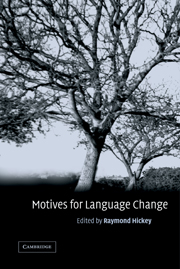Book contents
- Frontmatter
- Contents
- Notes on the contributors
- Acknowledgements
- Introduction
- Part I The phenomenon of language change
- Part II Linguistic models and language change
- 3 Metaphors, models and language change
- 4 Log(ist)ic and simplistic S-curves
- 5 Regular suppletion
- 6 On not explaining language change: Optimality Theory and the Great Vowel Shift
- Part III Grammaticalisation
- Part IV The social context for language change
- Part V Contact-based explanations
- Part VI The typological perspective
- Index
- References
3 - Metaphors, models and language change
Published online by Cambridge University Press: 22 September 2009
- Frontmatter
- Contents
- Notes on the contributors
- Acknowledgements
- Introduction
- Part I The phenomenon of language change
- Part II Linguistic models and language change
- 3 Metaphors, models and language change
- 4 Log(ist)ic and simplistic S-curves
- 5 Regular suppletion
- 6 On not explaining language change: Optimality Theory and the Great Vowel Shift
- Part III Grammaticalisation
- Part IV The social context for language change
- Part V Contact-based explanations
- Part VI The typological perspective
- Index
- References
Summary
Introduction
‘A myth in the widest sense is a story or image that structures some epistemic field … But the function of the myth, as a structuring device … is in principle independent of its truth value. Its utility derives from its perceived truth or explanatory or gap-filling efficiency’ (Lass 1997: 4).
These wise words come from Roger Lass's critical survey of the practice of historical linguistics, and his discussion of standards which should be adopted in historiographical activities such as reconstructing and explaining (Lass 1997). He explores in a coherent and enlightening way, ‘some of our central myths and rituals’ (1997: 8), and discusses how we form our theories. The overall book is a culmination of decades of enquiry into the nature of the discipline of linguistics, and his writings en route have become essential reading for today's historical linguists (e.g. Lass 1980, 1986, 1993).
As part of his discussion, Lass explores metaphor. Metaphors, he notes, are often thought of as vague sloppy things, as compared with good theories. ‘But one could argue on the contrary that theory often (maybe normally) is the formalization of metaphor’ (1997: 32), he suggests. By considering the English Great Vowel Shift, he shows ‘how metaphors can populate history with new objects and kinds, and provide both access to interesting new worlds, and great field-internal success’ (1997: 33).
The usefulness of metaphor in theory building has of course long been recognised, in a variety of scientific fields.
- Type
- Chapter
- Information
- Motives for Language Change , pp. 39 - 53Publisher: Cambridge University PressPrint publication year: 2003
References
- 4
- Cited by



